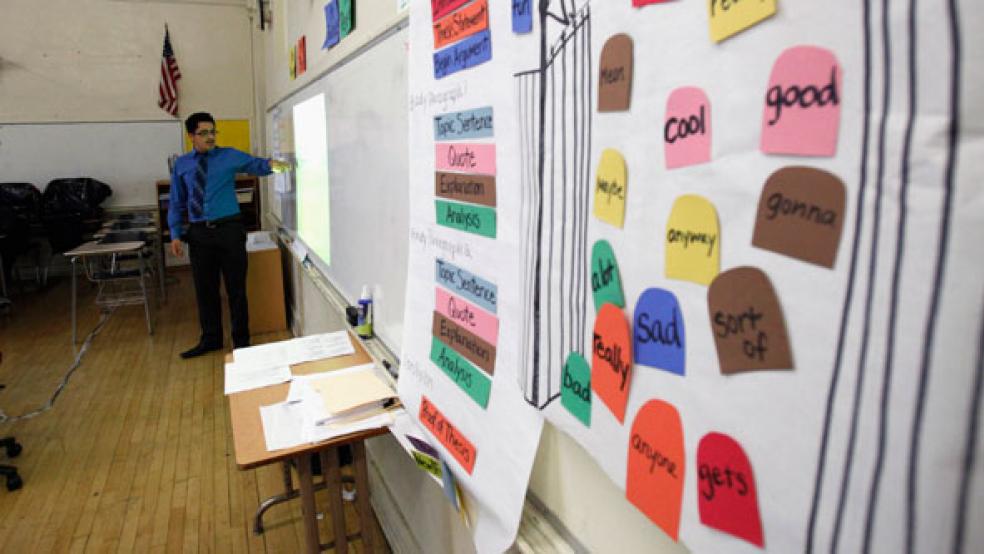The U.S. teacher training system is badly broken, turning out rookie educators who have little hands-on experience running classrooms and are quickly overwhelmed by the job, according to a report released Tuesday by the National Council on Teacher Quality.
The review found "an industry of mediocrity," with the vast majority of programs earning fewer than three stars on a four-star rating scale - and many earning no stars at all.The council, a bipartisan research and advocacy group, spent eight years developing the methodology, fighting in court to gain access to data and analyzing the information before issuing the report. It contains detailed analysis of 608 colleges and universities with teacher training programs and partial data on 522 others.
RELATED: HOW A COLLEGE EDUCATION CAN CLOSE THE INCOME GAP
Those 1,130 institutions collectively turn out more than 170,000 novice teachers annually, about 80 percent of the new teachers entering classrooms each year. Most of the rest come from non-traditional training programs that are not necessarily affiliated with colleges, such as Teach for America.
Freshly minted teachers "don't know how to teach reading, don't know how to master a classroom, don't know how to use data," said Kate Walsh, the council's president. "The results were dismal."
Attempts to improve teacher training have been under way. The two big teachers unions have both called for aspiring educators to get better mentoring and more practical experience before they graduate. They have also urged tougher certification standards that would require candidates to prove their skills in a classroom - not just pass a paper-and-pencil test - before earning a license.
Yet the study is the first to attempt a comprehensive rating of teacher preparation programs. The methodology drew immediate fire from some professors of education.
The council ratings lean heavily on a few factors: Whether a program is selective in its admissions; whether its students must take extensive courses in the subject areas they will be teaching; and how much hands-on experience students get in classroom management. Researchers also looked at syllabi, textbooks and the type of training offered in key fields, such as teaching reading.
But the study did not typically evaluate the quality of teaching within the training program or the success graduates may have had in the classroom."These rankings do not have a great deal to do with program quality," said Linda Darling-Hammond, a professor at the Stanford University School of Education, which received only mediocre ratings.
Several universities tried to block researchers from getting data about their programs; in Wisconsin, Minnesota and Missouri, the disputes escalated into court battles won by the National Council on Teacher Quality.
"Our members feel like they've been strong-armed," said Stephanie Giesecke, a director at the National Association of Independent Colleges and Universities. "These are not valid ways of rating our programs."
More robust evaluations may soon be coming.To maintain accreditation by the Council for Accreditation of Educator Preparation, teacher training programs may soon have to issue regular reports on their graduates: Do they pass licensing tests? Land jobs? Once in a classroom, do they help students learn, as measured by test scores and other metrics?
A panel of the accreditation council approved the new reporting requirement this month; the full board will take it up this summer.The Obama administration, meanwhile, has proposed focusing federal funding on training programs that can prove their graduates become effective teachers. The proposal remains under review, officials said.
For some public school administrators, change cannot come soon enough.
"Teacher preparation needs to be reformed from top to bottom," said Terry Grier, superintendent of the Houston Independent School District. The district puts rookie teachers through a summer training program because Grier does not trust that they have learned crucial skills, such as how to adjust lessons to reach kids of widely differing abilities.
For all its grim warnings, the new report does point to a few bright spots.It highlights successful teacher training programs at a handful of universities, including Ohio State, which recently launched an undergraduate degree program that gives students hands-on experience in a classroom each year.Furman University in Greenville, S.C., also won high marks for its academic rigor and intensive mentoring of aspiring teachers.
"When they leave our program, we're putting a stamp on them that says, 'This person can work with other peoples' children,'" said Scott Henderson, director of program development for the teacher education program. "That's a huge responsibility."
The National Council on Teacher Quality was founded in 2000 and often advocates for education reform policies opposed by teacher unions. It is funded by private foundations, including the Bill & Melinda Gates Foundation, the Carnegie Corporation of New York and The Eli and Edythe Broad Foundation.




